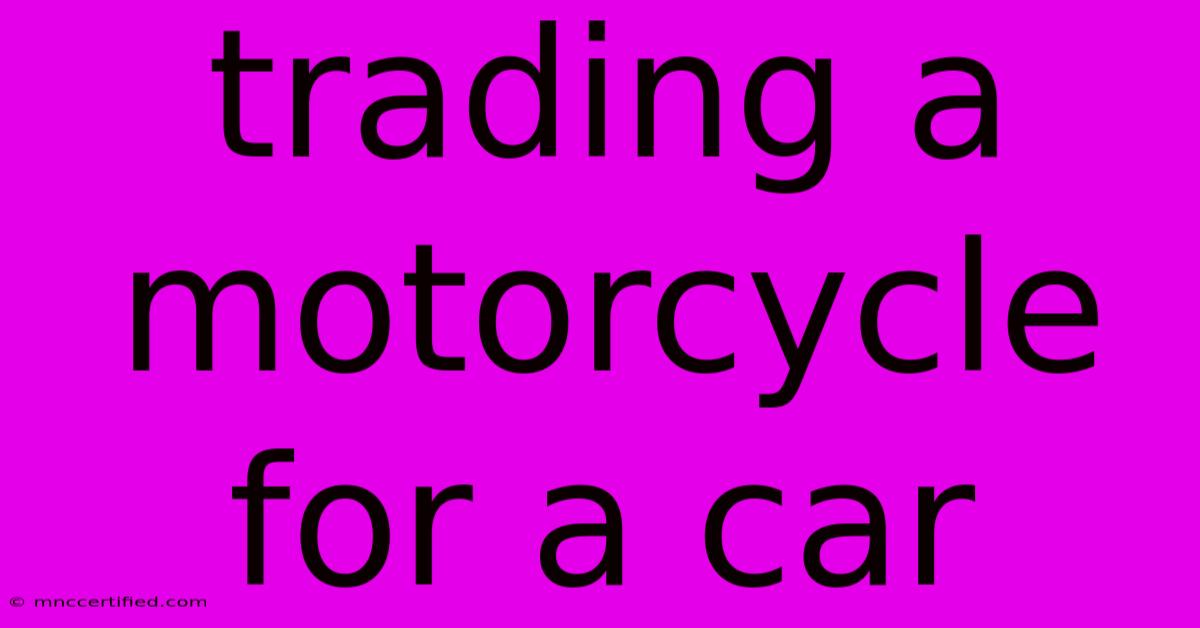Trading A Motorcycle For A Car

Table of Contents
Trading Your Motorcycle for a Car: A Practical Guide
Trading your beloved motorcycle for a car is a big decision, signifying a potential shift in lifestyle and priorities. This comprehensive guide will walk you through the process, covering everything from assessing your needs to finalizing the deal, ensuring a smooth and successful transition.
Why Trade Your Motorcycle for a Car?
The reasons for swapping two wheels for four are as diverse as the riders themselves. Common motivations include:
- Increased practicality: Cars offer superior cargo space, making them ideal for families, frequent shopping trips, or hauling larger items.
- Improved weather protection: Say goodbye to rain-soaked rides and freezing temperatures! Cars provide a climate-controlled environment.
- Enhanced safety: Cars generally offer better crash protection than motorcycles, providing a greater sense of security, especially for longer journeys.
- Passenger capacity: Carrying passengers is significantly easier and safer in a car.
- Comfort on long journeys: Long-distance riding on a motorcycle can be tiring. Cars offer a more comfortable and less physically demanding driving experience.
Assessing Your Needs and Budget
Before you start browsing car dealerships, take some time to honestly assess your needs and budget:
- Vehicle type: What kind of car best suits your lifestyle? Sedan, SUV, hatchback? Consider fuel efficiency, size, and features.
- Budget: Determine how much you're willing to spend, factoring in the trade-in value of your motorcycle and any additional costs (taxes, fees, insurance). Get pre-approved for a car loan if needed to avoid surprises.
- Features: Prioritize essential features versus nice-to-haves. Navigation, safety features, and fuel economy are often top considerations.
Determining Your Motorcycle's Trade-In Value
Your motorcycle's value is a crucial factor in your trade. Several factors influence its worth:
- Make and model: Popular and sought-after models generally command higher prices.
- Year and condition: Newer motorcycles in excellent condition will fetch more.
- Mileage: Lower mileage typically translates to higher value.
- Modifications: Aftermarket parts can either increase or decrease value depending on their desirability.
- Market research: Research your motorcycle's value online using resources like Kelley Blue Book (KBB) or Edmunds. Check recent listings for similar bikes to get a realistic estimate.
Pro Tip: Clean your motorcycle thoroughly before showing it to potential buyers or dealers to maximize its appeal and trade-in value.
Finding the Right Car and Dealership
Now comes the exciting part: finding your new car!
- Online research: Use online car listings to browse different models and compare prices. Websites like Autotrader, Cars.com, and CarGurus are excellent starting points.
- Dealership visits: Visit multiple dealerships to compare offers and negotiate prices. Don't be afraid to haggle!
- Test drives: Always test drive any car before committing to a purchase. Pay close attention to handling, comfort, and features.
Negotiating the Trade and Finalizing the Deal
- Present your motorcycle: Bring your motorcycle's title and maintenance records to the dealership. Be prepared to discuss its condition and features.
- Negotiate the trade-in value: The dealership's initial offer for your motorcycle might be lower than its actual value. Don't hesitate to negotiate; having your research handy helps.
- Review the paperwork: Carefully review all the paperwork before signing anything, especially the contract and financing details. Understand all fees and charges.
Post-Trade Considerations
After finalizing the trade, remember these crucial steps:
- Insurance: Update your auto insurance policy to reflect your new vehicle.
- Registration: Register your new car with your local Department of Motor Vehicles (DMV).
- Maintenance: Familiarize yourself with your car's maintenance schedule to keep it in top condition.
Trading your motorcycle for a car is a significant decision, but by following this comprehensive guide, you can ensure a smooth and successful transaction. Remember to prioritize research, negotiate effectively, and thoroughly review all paperwork. Happy driving!

Thank you for visiting our website wich cover about Trading A Motorcycle For A Car. We hope the information provided has been useful to you. Feel free to contact us if you have any questions or need further assistance. See you next time and dont miss to bookmark.
Featured Posts
-
Broken Bow Investment Property
Nov 28, 2024
-
Jack Daniels Bottled In Bond
Nov 28, 2024
-
Invest Fest Atlanta 2024 Dates
Nov 28, 2024
-
Lana Del Rey Uk Tour Fans React
Nov 28, 2024
-
Dee Devlins Online Rant Mc Gregors Fiancee Speaks Out
Nov 28, 2024